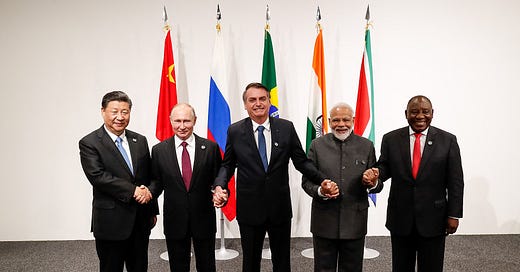BRICS is an acronym that stands for Brazil, Russia, India, China, and South Africa. It is an association of five major emerging economies that are characterized by their large populations, rapidly growing economies, and increasing geopolitical influence. The term was coined in 2001 by economist Jim O'Neill, who believed that these countries had the potential to become major players in the world economy.
BRICS was formally established in 2006, and since then, the member countries have worked to strengthen their economic and political ties. They have held annual summits to discuss issues of mutual interest and have established a number of institutions to support their cooperation, including a development bank and a business council.
The BRICS countries are home to more than 40% of the world's population and have a combined GDP of around $16 trillion. This makes them an important force in the global economy, and their increasing influence has led to calls for a greater say in global governance. The member countries have expressed their desire for a more balanced international system, with a greater emphasis on the needs and perspectives of developing countries.
While BRICS is primarily an economic and political association, there has been some speculation about its potential to compete with NATO, the North Atlantic Treaty Organization. NATO is a military alliance of 30 countries, primarily in Europe and North America, formed in 1949 as a response to the Soviet Union's expansionist policies. Its primary purpose is to provide collective defence against potential military threats, and it has played a significant role in shaping international security and defence policies since its formation.
While BRICS and NATO serve different purposes and operate in different spheres, there are some potential areas of competition. For example, the BRICS countries have been increasing their defence spending in recent years, and China, in particular, has been developing its military capabilities. Additionally, the member countries have expressed their desire to play a greater role in shaping international security policies, which could bring them into conflict with NATO and other established powers.
However, it is important to note that BRICS is not a military alliance, and it does not have the same level of military capability as NATO. While the member countries have been increasing their defence spending, it is unlikely that they will be able to directly compete with NATO in terms of military power and influence. Furthermore, the member countries have not expressed any desire to challenge NATO's military dominance, and there is little indication that they are interested in pursuing a confrontational approach.
BRICS stands as a crucial alliance comprising major emerging economics with the capacity to exert a substantial impact on the global economic and political landscape. Although there might be areas of rivalry between BRICS and NATO, it seems improbable that BRICS could directly challenge NATO in terms of military strength and away. Nonetheless, the growing economic and geopolitical influence of BRICS remember nations signifies their ongoing pivotal role in shaping the global agenda. They could serve as a noteworthy counterbalance to established powers such as NATO.




